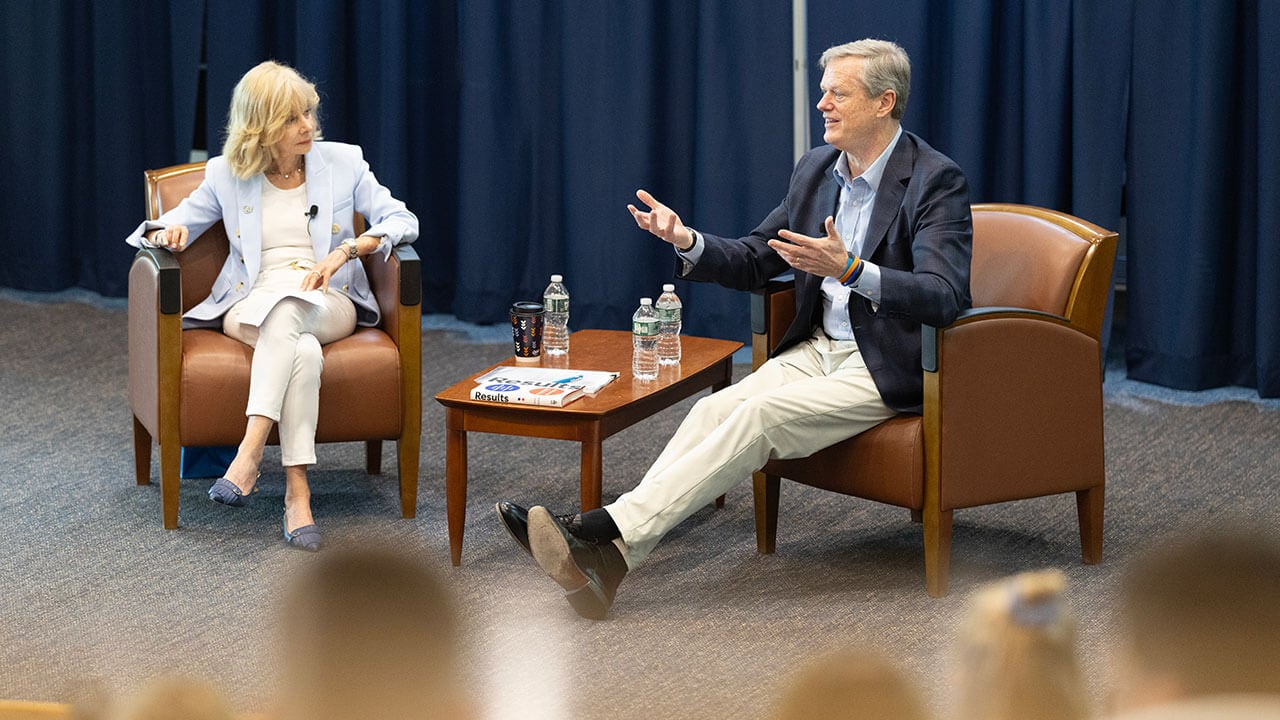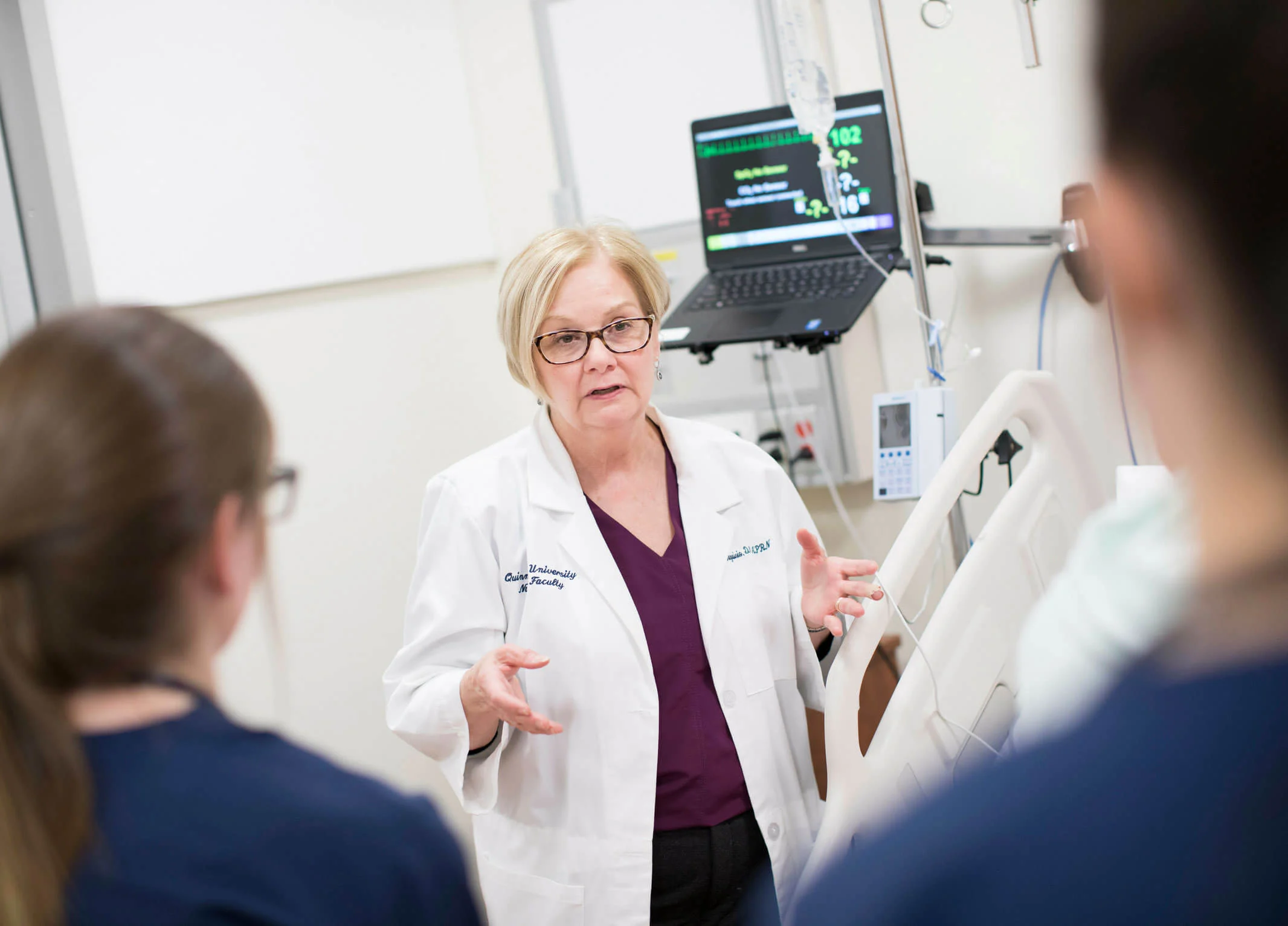
A leading American businessman and politician, Baker is now the sixth president of the National Collegiate Athletic Association (NCAA), a role he assumed in March 2023. During an engaging conversation with President Olian on April 29, Baker discussed wins and losses and how those experiences have shaped his ability to successfully navigate challenges. Their talk drew a full house in the Mount Carmel Auditorium to wrap up Quinnipiac’s Critical Conversation Speaker Series this year.
Before joining Quinnipiac in 2018, Olian served as dean of UCLA Anderson School of Management and John E. Anderson Chair in Management, following leadership and faculty roles at Pennsylvania State University and the University of Maryland. She is currently chairperson of the Mid-Atlantic Athletic Conference – the MAAC – of which Quinnipiac is a member. Olian is also an appointed member of the Knight Commission on Intercollegiate Athletics, an independent group that leads transformational change to prioritize college athletes’ education, health, safety and success.
Quinnipiac Interim Vice President for Equity and Inclusion David Fryson welcomed Olian and Baker to the floor. Fryson said the Critical Conversation Series has exceeded all expectations and is a model he believes could be utilized nationally.
“In the national environment that is increasingly strident and separate, each of these conversations have really been a touchstone to the best of what we can be as a college, how we can operate as a college campus and how we can operate as a unified nation,” said Fryson. “I just wish the whole country could be privy to the depth and breadth of what we have experienced during these conversations. I believe at Quinnipiac we have a potential answer to the national challenge of respect and the need for dialogue on college campuses.”
As a two-term governor of Massachusetts, spanning from 2015 to 2023, Baker completed the post as most popular governor in America, with a 75% satisfaction rating, Olian noted. Along the way, he accomplished important initiatives and reforms, including shaping one of the nation’s only comprehensive police reform bills in 2020, which went on to pass legislation. All of this was done, as Olian pointed out, by a Republican leading a legislatively blue state.
“Thirty years of Democratic legislature, and you managed to bridge differences,” said Olian.
Baker said his opportunity to forge cooperation across party lines really began after he lost his first race 2010, in a bid to unseat the incumbent Democratic Massachusetts Governor Deval Patrick.
“If you were to say to me what were the greatest learning moments of my life, they’ve all been points of pain, and points of loss, and periods of time in which awful things happened,” said Baker.
After his loss, Baker asked reporters and supporters what he could have done better. One response, from a supporter in sales, resonated.
“He said, ‘You spent way too much time with your customers and not enough time with your prospects,” said Baker. “And what he meant by that was first-time candidates like to get in front of audiences that you think will agree with you, and you don’t spend enough time with people who don’t agree with you. And that rang in my ears for three years.”
When discussing making another bid for governor with his wife, Lauren, “…the thing we talked about was running for 100% of the vote,” Baker said.
To do that, “…we basically campaigned in places and spaces where we were going to lose, and probably lose significantly,” he said. “But getting in front of those audiences, and into those rooms, and having people whose experiences were completely different than mine, in so many ways, made me so much better as a candidate. Ultimately, I think that had a lot to do with why we won and made me a better governor than I would have been otherwise. Also, it just made me a better person.”
Working to find common ground in a room where people have differing opinions is a practice Baker can trace back to growing up in Massachusetts. His Republican dad, Charles Duane Baker III, served in several departmental roles in the Richard Nixon and Ronald Reagan presidential administrations. His mother, Elizabeth “Betty” Baker, was a Democrat.
“My parents were happily married for 65 years, but I don’t think they ever voted for the same person in an election,” said Baker.
The Baker family’s dinner table was a place for debate which often drew in the three Baker kids as well as their friends.
“Our dinner table was kind of must-watch TV. It was not a fight, it was not a contest. It was a conversation. My parents listened to each other, and if you wanted to engage in the debate, you had to listen, too,” Baker said. “The biggest thing I learned from my parents was they could change each other’s minds. They could get each other, and me, to adjust and modify what I thought was either the right policy or the right way to think about it. And it’s really where I got interested in public service in the first place.”
Baker earned his BA from Harvard University and MBA from Northwestern University's Kellogg School of Management, where he concentrated on public not-for-profit management.
“I said on my application my goal was to run a nonprofit or state agency,” Baker said. “And I always wanted to be in a room like the one I grew up in, where there are a lot of people with different points of view who are part of the conversation.”
In 1991, he was appointed Massachusetts Undersecretary of Health and Human Services, then was appointed Secretary of Health and Human Services of Massachusetts, and later served as Secretary of Administration and Finance. Baker went on to become CEO of Harvard Vanguard Medical Associates and later Harvard Pilgrim Health Care, a nonprofit health benefits company.
Now, he’s leading the NCAA, an entity which has 180 committees, 500,000 student athletes, 1,100 institutions, 19,000 teams and 97 conferences, through a period when the organization is facing numerous complex and critical issues.
“This is easily the most challenging decision-making environment I’ve ever been around, before you even get to the nature of the size and complexity of the things we’re talking about here,” said Baker. “Part of why there’s so much piled up on the plate of the NCAA, and college sports generally, is it really is an enormously diverse community of decision-makers.”
Over 150 days, Baker met with all 97 conferences to find common ground and hear their perspectives, including the question of whether student-athletes should become employees of an institution, as opposed to students who are scholarship recipients.
“The one thing that came out of all those 97 conversations was that employment is an existential threat. Everybody said that,” said Baker. “For half the schools in the NCAA, that would basically double the size of the employed population on campus, and a lot of them would say we’re out of this business — we’ll play club sports.”
In the NCAA, 70 schools spend from $100 million to $250 million on their athletic programs, and 700 schools spend less than $25 million, said Baker.
“The opportunity that we have, particularly with the employment question, is what I tried to do is to convert it into a conversation about compensation. Because I have no qualms saying that the folks who play for those institutions with the $100 million to $250 million budgets, they should be doing more for their student-athletes, period. Now they proposed that. But I hate it when people in the media and others broad-brush all college sports and say that it’s all like that. Because it’s not. That’s 5% of college sports. The 95% of college sports loses money in sports, offers it because it’s an important part of the academic and social and engagement environment and believes that it has real positive benefits for the kids who have a chance to play and compete,” Baker said.
“So we need to convince people that in their zeal to find a way to compensate folks who are part of these high-resource institutions, don’t ruin the rest of the schools that for all intents and purposes are doing a lot of the same things they’ve been doing for a really long time,” Baker continued. “And invest in their athletic programs. And when we started talking to Congress about that, we were nowhere, and now, we are definitely somewhere at this point.”
Baker said there are no short cuts to resolving complicated issues involving a lot of different enterprises.
“What you need to be able to do is see if you are making progress. And I believe on some of these issues, we are making progress,” he said.
In this Article
Stay Connected
Get the latest news and events sent right to your email by subscribing to Quinnipiac Today.
Subscribe




























